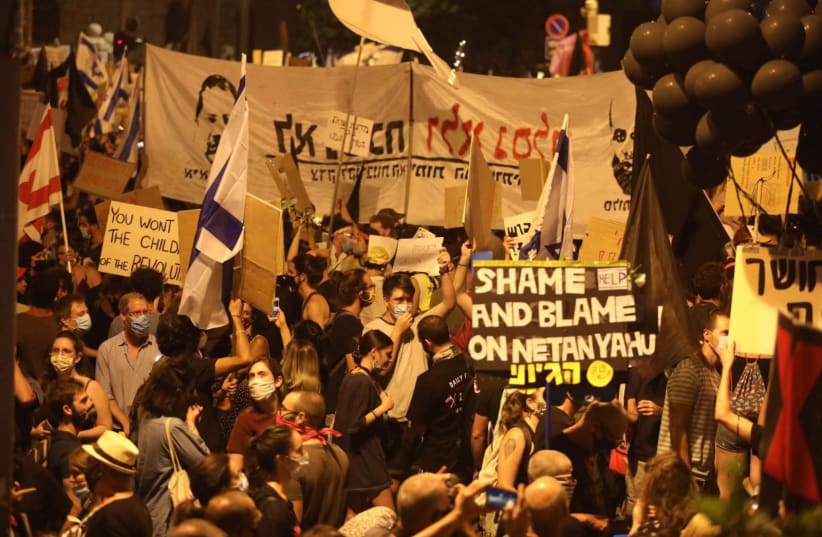The “Black Flags” movement, one of the main groups behind the “Balfour Protests” in Jerusalem against Prime Minister Benjamin Netanyahu, did the right thing last week when it announced that it will no longer attend the main demonstrations during the nationwide lockdown.
Despite what we saw on Sunday night, and at other gatherings during the holiday – when people took up their right to protest in line with current restrictions, the idea to postpone the large weekly protest and to demonstrate in other ways without gathering in large groups, is commendable.
During a nationwide lockdown, and when social distancing is imposed throughout all groups in society, halting the mass protests that we have seen for the past 13 weeks is a different kind of demonstration – it is a display of solidarity with the rest of the nation.
Complaints have been sounded about the protests continuing despite the lockdown, and how it doesn’t make sense that over 10,000 people can gather on a street corner, while Rosh Hashanah prayer services have had to be held in small groups of up to 20 people.
The decision to postpone the protests for the coming three weeks is an answer to those who label the protesters “privileged,” and condemn their weekly gatherings at Paris Square in Jerusalem. Halting the protests is like saying to the rest of the nation: “Yes, we hear you and we want to stand with you at this difficult time. We’re staying home.”
But it is important to stress that allowing people to hold legal protests, a citizen’s fundamental and basic right in a free country, is essential for maintaining Israel as a true democracy. This holds true even during a pandemic.
In a protest, citizens can express their genuine concerns about the future of the country, and they can do so in solidarity with others. It is a manifestation of the right of all people, of all groups, of all sectors of society to exercise their freedom of speech.
The right to protest is granted not only to those from the Left, but also to people on the Right. In the first few weeks of the “Balfour Protests,” alongside the large anti-Netanyahu demonstrations, some right-wing groups held pro-Netanyahu rallies that were attended by dozens of the prime minister’s supporters, including Likud MKs in some instances.
This is why the calls to stop protests outright are anti-democratic. Not only would this harm the country, it also would play into the hands of those who protest in Jerusalem and who say that the current government is damaging Israel’s democracy.
Since the protests began, the prime minister has used his own platforms to attack the demonstrators in order to try to shift public opinion against those who are pointing the finger at his mistakes as he manages the virus and leads the country.
Among the allegations leveled against the protesters was that they are spreading diseases (a claim that has been repeated by his supporters even though it has been refuted by the Health Ministry), and claims that the Health Ministry has no information about the spread of coronavirus at the protests because the demonstrators don’t carry their cellphones at the rallies and cannot be tracked.
Its likely that this accusation has motivated people to continue to protest and to keep coming to Balfour in defiance of the lockdown and despite the health risk.
It is exactly during these times – when the government imposes emergency regulations – that accountability and transparency are needed. Oversight of the government’s decisions cannot be swept aside and public protests are one of the ways to ensure that the government stays in line and does not act to undermine peoples’ civil liberties and basic rights.
But during these three weeks of lockdown, when we are all expected to stay at home and do our bit to help lower the infection rate, there is an opportunity for those who care about the country to show people who remain at home that they care.
Stopping the protests for a few weeks is not the end of democracy. It is a way to show solidarity.
